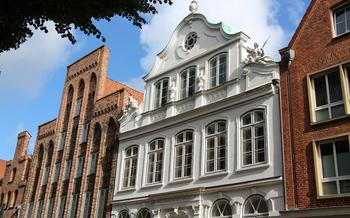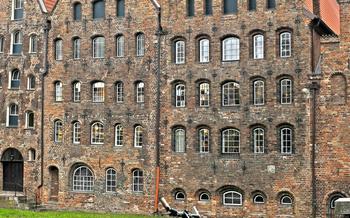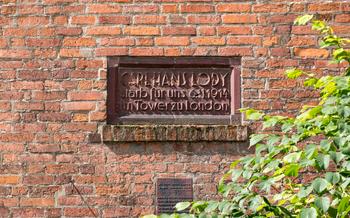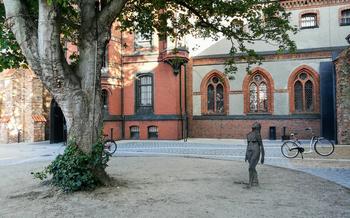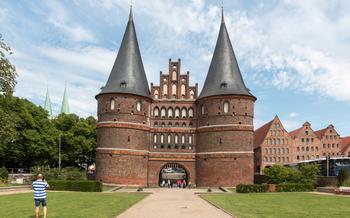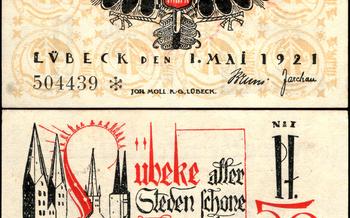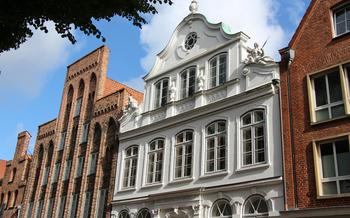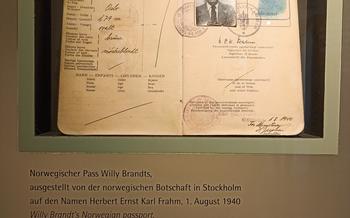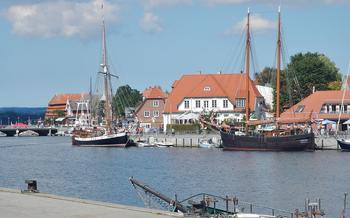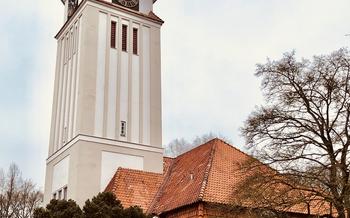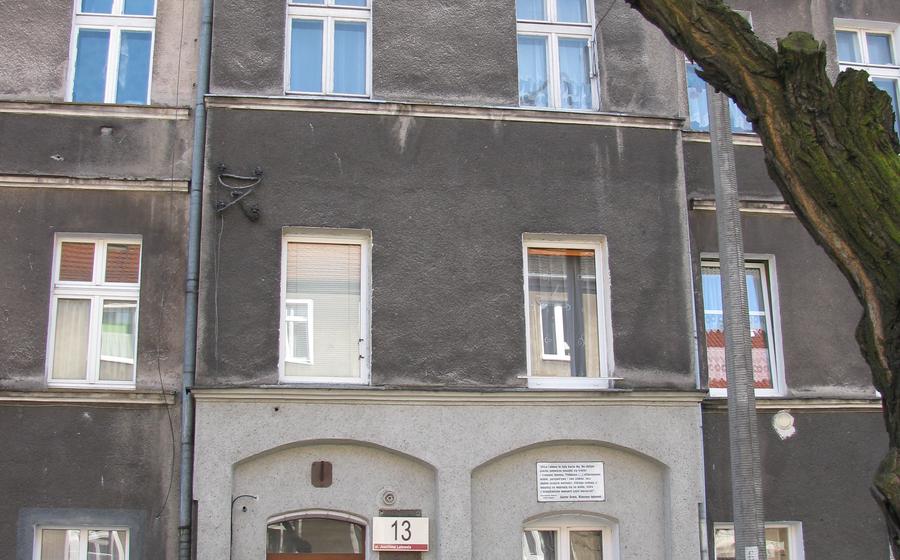
Günter Grass Haus (Günter Grass House)
- A Literary Legacy:
- The Günter Grass Haus: A Literary Haven in Lübeck's Old Town
- Exhibitions and Collections:
- Literary Events and Readings:
- Educational Programs:
- Research and Scholarship
- Guided Tours
- Visitor Information
- Museum Shop
- Online Resources
- Community Engagement
- Literary Landmarks in Lübeck
- Cultural Events in Lübeck
- Local Cuisine and Restaurants
- Insider Tip:
A Literary Legacy:
Günter Grass, the Nobel laureate, left an indelible mark on German literature. His works, spanning novels, poetry, and dramas, delved into the complexities of German history, identity, and politics. His commitment to social justice and his critical examination of post-war Germany made him a controversial yet influential figure. Exploring his life and works at the Günter Grass Haus offers a profound insight into the literary and cultural landscape of Germany, shedding light on the historical and cultural context that shaped his writing.
The Günter Grass Haus: A Literary Haven in Lübeck's Old Town
Amidst the charming cobbled streets of Lübeck's old town, a haven for literature enthusiasts awaits: the Günter Grass Haus. This remarkable museum is dedicated to preserving and celebrating the life and work of Nobel laureate Günter Grass, one of Germany's most celebrated and influential writers.
Designed by renowned architect Meinhard von Gerkan, the Günter Grass Haus stands as a testament to Grass's legacy. Its striking, modern architecture seamlessly blends with the historic surroundings, creating a harmonious dialogue between the past and the present.
The museum's mission is to provide visitors with a comprehensive insight into Grass's literary achievements and his profound impact on German literature. Through its captivating exhibitions, events, and educational programs, the Günter Grass Haus invites visitors to delve into the mind and imagination of this literary giant.
Exhibitions and Collections:
The Günter Grass Haus offers a diverse range of exhibitions and collections that provide a comprehensive insight into Grass's life and work. Permanent exhibitions showcase his manuscripts, drawings, sculptures, and other personal items, offering visitors a glimpse into his creative process and his engagement with contemporary issues. Temporary exhibitions explore specific themes or aspects of Grass's work, often featuring collaborations with other artists, writers, and scholars. The museum's collection also includes a significant number of artworks by Grass, demonstrating his versatility as an artist and his lifelong commitment to visual expression. Through its exhibitions and collections, the Günter Grass Haus offers a unique opportunity to explore the multifaceted legacy of one of Germany's most celebrated writers.
Literary Events and Readings:
The Günter Grass Haus hosts a diverse range of literary events and readings throughout the year, providing visitors with opportunities to engage with authors, scholars, and literary enthusiasts. These events include book presentations, readings by contemporary writers, discussions on literary topics, and panel discussions on current social and political issues. Visitors can listen to authors read from their works, participate in Q&A sessions, and gain insights into the creative process and the role of literature in society. The museum also organizes special events and festivals, such as the Günter Grass Festival, which celebrates the author's life and work through a series of literary events, exhibitions, and performances. These events offer a platform for literary discourse, promote emerging writers, and foster a sense of community among readers and writers.
Educational Programs:
The Günter Grass Haus offers a diverse range of educational programs designed to foster a deeper understanding of Grass's work and its relevance to contemporary society. These programs are tailored to various audiences, including students, teachers, and the general public. Interactive workshops, lectures by renowned scholars, and guided tours provide participants with insights into Grass's writing process, his engagement with social and political issues, and the cultural context of his work. Through these programs, the museum aims to inspire critical thinking, promote literary appreciation, and encourage dialogue on the enduring themes explored in Grass's literature. Whether you are a student seeking to delve deeper into Grass's oeuvre or a curious individual seeking to expand your literary horizons, the Günter Grass Haus offers a stimulating and enriching educational experience.
Research and Scholarship
The Günter Grass Haus is not just a museum; it's also a vibrant center for research and scholarship on Günter Grass's work and its impact. The museum collaborates with universities and research institutions worldwide, hosting research projects, conferences, and publications that delve deep into Grass's literature and its cultural significance. Scholars and researchers from various disciplines converge at the Günter Grass Haus to explore Grass's engagement with history, politics, art, and philosophy. Through these collaborations, the museum fosters a deeper understanding of Grass's work and its enduring relevance to contemporary society, contributing to the ongoing study and appreciation of his literary legacy.
Guided Tours
To fully immerse yourself in the world of Günter Grass and his literary legacy, consider embarking on a guided tour of the Günter Grass Haus. Knowledgeable and passionate guides will lead you through the museum's exhibitions, shedding light on Grass's life, work, and the historical and cultural context that shaped his writing.
Different types of tours are available to cater to diverse interests and preferences. General tours provide a comprehensive overview of Grass's life and work, while thematic tours delve deeper into specific aspects of his writing, such as his political engagement or his exploration of German history. Group tours are also available for schools, universities, or other organizations.
Tours are conducted in German and English, and the duration varies depending on the type of tour chosen. Make sure to book your tour in advance, especially during peak season, to secure your spot and avoid disappointment.
Visitor Information
To fully immerse yourself in the world of Günter Grass and his literary legacy, plan a visit to the Günter Grass Haus, located at Glockengießerstraße 21 in Lübeck's historic old town. The museum is open Tuesday through Sunday, from 10 am to 5 pm. Standard admission fees apply, with discounts available for students, seniors, and groups.
Reaching the museum is a breeze, whether you choose to stroll through the charming cobblestone streets or take advantage of Lübeck's excellent public transportation system. For those arriving by car, there are several nearby parking garages. The museum is wheelchair accessible, ensuring an inclusive experience for all visitors.
To avoid the crowds and fully savor your visit, plan your trip outside of peak tourist season, typically during the shoulder months (April-May and September-October). This will allow you to delve deeper into Grass's work and engage with the exhibits at a more leisurely pace.
Museum Shop
The Günter Grass Haus features a well-stocked museum shop that offers a range of items related to Grass's life and work, as well as other literary and cultural offerings. Visitors can browse a selection of books, including Grass's own works and publications about his life and influence. The shop also carries unique souvenirs, such as postcards, posters, and magnets featuring Grass's artwork and quotes. For those looking for a special keepsake, the museum shop offers limited-edition prints, signed books, and other exclusive items. By making a purchase at the museum shop, visitors not only take home a piece of Grass's legacy but also support the museum's ongoing efforts to preserve and promote his literary heritage.
Online Resources
The Günter Grass Haus maintains an informative and engaging website that serves as a valuable resource for visitors and enthusiasts of Günter Grass's work. Here, you can explore virtual exhibitions that delve into different aspects of Grass's life and writing. Immerse yourself in interactive timelines, explore Grass's literary influences, and discover the inspirations behind his iconic works. The website also features a comprehensive archive of Grass's writings, including excerpts from his novels, poems, and essays.
Additionally, the Günter Grass Haus is active on social media platforms such as Facebook, Twitter, and Instagram. Through these channels, the museum shares news and updates about upcoming events, exhibitions, and educational programs. Visitors can engage with the museum's curators and educators, participate in online discussions, and access exclusive content not available elsewhere.
By staying connected with the Günter Grass Haus online, you can extend your exploration of Grass's legacy and remain informed about the latest developments and research related to his work. Whether you're planning a visit to the museum or simply want to delve deeper into the world of Günter Grass, the museum's online resources offer a wealth of information and opportunities for engagement.
Community Engagement
The Günter Grass Haus is deeply committed to fostering a vibrant literary culture within the local community. It actively collaborates with schools, libraries, and other cultural institutions to promote reading, writing, and creativity among people of all ages. Through outreach programs and initiatives, the museum encourages literary appreciation and expression, inspiring the next generation of writers and readers. The museum serves as a vital hub for literary discourse and community engagement, bringing together diverse voices and perspectives to celebrate the enduring legacy of Günter Grass and the power of literature to shape society.
Literary Landmarks in Lübeck
Beyond the Günter Grass Haus, Lübeck boasts a wealth of other literary landmarks that invite visitors to delve deeper into the city's rich literary heritage. One notable site is the Buddenbrookhaus, the former home of the Mann family, where the Nobel laureate Thomas Mann spent his childhood. Today, the house serves as a museum dedicated to the Mann family and their literary legacy. Visitors can explore exhibits on the lives and works of Thomas Mann, his brother Heinrich Mann, and their father, the merchant Thomas Johann Heinrich Mann.
Another must-visit destination for literary enthusiasts is the St. Mary's Church, where Günter Grass is buried. The church is a magnificent example of Gothic architecture and houses a wealth of artistic treasures, including the famous Totentanz (Dance of Death), a series of 15th-century murals depicting the inevitability of death. Grass's grave is located in the churchyard, and visitors can pay their respects to the beloved author while soaking in the tranquil atmosphere of this historic site.
Cultural Events in Lübeck
Lübeck is a city that pulsates with cultural energy, offering a diverse range of events and festivals throughout the year. Literature enthusiasts will delight in the many events dedicated to the written word, such as the Lübeck Book Fair, which attracts renowned authors, publishers, and book lovers from around the world. The fair features book signings, readings, discussions, and exhibitions, providing a platform for literary exchange and discovery.
Another highlight is the Lübeck Literary Festival, which brings together established and emerging writers for a week of readings, workshops, and panel discussions. This vibrant festival celebrates the power of storytelling and offers attendees the chance to engage with their favorite authors and discover new voices in literature.
For those interested in experiencing Lübeck's literary heritage beyond the Günter Grass Haus, there are several walking tours and literary maps available. These guided tours take visitors to significant literary landmarks associated with Grass and other notable authors, shedding light on the city's rich literary history and cultural heritage.
Whether you're a bookworm, a literature enthusiast, or simply seeking a culturally enriching experience, Lübeck offers an array of events and festivals that will captivate and inspire. Immerse yourself in the city's vibrant literary scene and discover the many ways in which Lübeck celebrates the written word.
Local Cuisine and Restaurants
When visiting Lübeck, take the opportunity to savor the culinary delights of the region. Lübeck's cuisine is influenced by its proximity to the sea and the countryside, offering a blend of fresh seafood, hearty meats, and delicious local produce.
For a taste of traditional Lübecker cuisine, try the classic dish of "Labskaus," a hearty stew made with corned beef, potatoes, and beets. Another local specialty is "Rotspon," a red wine made from grapes grown in the region.
If you're looking for a restaurant with a literary connection, head to "Zur Glocke," a historic restaurant that has been frequented by writers and artists for centuries. It's said that Günter Grass himself was a regular customer, and you can still see his favorite table in the corner.
For a more modern dining experience, try "Das Literaturcafé," a cozy café and restaurant that hosts literary events and readings. Their menu features dishes inspired by literature, and you can enjoy your meal while surrounded by books and literary memorabilia.
No matter where you choose to dine in Lübeck, be sure to sample the local specialties and immerse yourself in the city's rich culinary culture.
Insider Tip:
My personal recommendation is to take a leisurely stroll through Lübeck's charming old town before or after your visit to the Günter Grass Haus. Immerse yourself in the city's rich history and literary legacy as you wander past the Gothic spires of the Marienkirche, the medieval town hall, and the Buddenbrookhaus, once home to the Mann family, immortalized in Thomas Mann's novel of the same name. Along the way, stop at one of the many cozy cafés or traditional restaurants to savor local delicacies and soak in the vibrant atmosphere of this literary haven.
